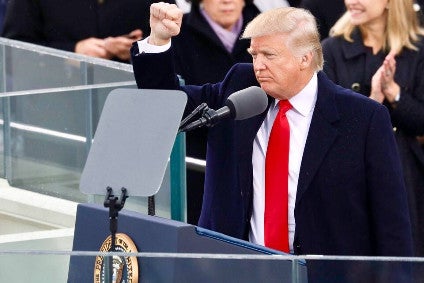
As widely anticipated, US president Donald Trump has moved swiftly since taking office to sign an executive order withdrawing the US from the Trans-Pacific Partnership (TPP) international trade deal, branding the move a “great thing for the American worker”.
Although the auto industry impact of TPP was always going to be relatively small, the move signals the new administration’s determination to follow through on campaign promises to reset the US’s international trade arrangements. That will cause some concern in an automotive sector nervously eyeing any changes to NAFTA which has been at the heart of North American manufacturing strategies for a large number of OEMs who have built or are planning manufacturing plants in low-cost Mexico.

Discover B2B Marketing That Performs
Combine business intelligence and editorial excellence to reach engaged professionals across 36 leading media platforms.
The TPP was a free trade deal involving the US, Japan and ten other Pacific rim countries. It would have reduced trade barriers between the nations involved. It was agreed at the end of 2015, but was awaiting ratification by all signatory countries. In his presidential campaign, Trump said that the US would be pulled out of international trade treaties that he claimed damaged American manufacturing industry and reduced US jobs.
A statement on the White House website suggested that the US wants to replace the TPP with bilateral trade agreements with the countries involved. “This action ushers in a new era of US trade policy in which the Trump Administration will pursue bilateral free trade opportunities with allies around the world, wherever possible, to promote American industry, protect American workers, and raise American wages,” the statement said.
“It is the policy of the Trump Administration to represent the American people and their financial well-being in all negotiations, particularly the American worker, and to create fair and economically beneficial trade deals that serve their interests.”
Automakers will be more concerned about the new administration’s approach to NAFTA and any change to free trade arrangements on shipments of vehicles from Mexican plants for sale in the US. Trump has said he will scrap or renegotiate NAFTA and also talked about a 35% ‘border tax’ on goods shipped from the US to Mexico.
Trump also warned a group of US company CEOs – including Ford CEO Mark Fields – yesterday at a White House meeting that that he would place a ‘very major’ border tax on companies that moved production overseas and export products back into the US.
“A company that wants to fire all of its people in the US, and build some factory someplace else, and then thinks that that product is going to just flow across the border into the US – that’s not going to happen,” Trump said. He added that he was prepared to slash regulations by up to 75 per cent if they agree not to move jobs outside the US.
Senator John McCain criticised the TPP withdrawal decision and said that it potentially creates an opening for China. “It will create an opening for China to rewrite the economic rules of the road at the expense of American workers,” McCain said. “And it will send a troubling signal of American disengagement in the Asia-Pacific region at a time we can least afford it.”
Japan and several other TPP signatories have vowed to press ahead with the pact despite Mr Trump’s decision. Some analysts believe the US withdrawal could tempt China to propose a new regional trade deal based on TPP’s template.
White House press secretary Sean Spicer has said that Trump will move away from multilateral deals towards new bilateral arrangements, claiming the administration “wants free and fair trade around the globe”.






